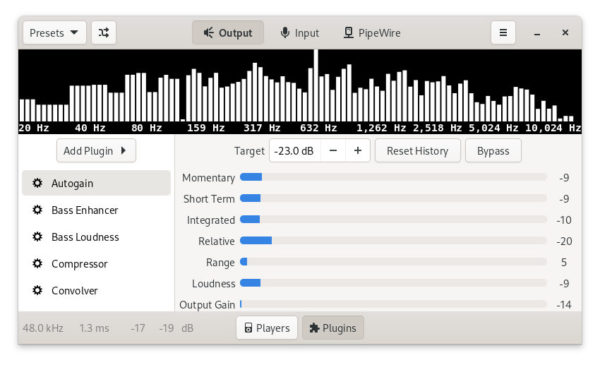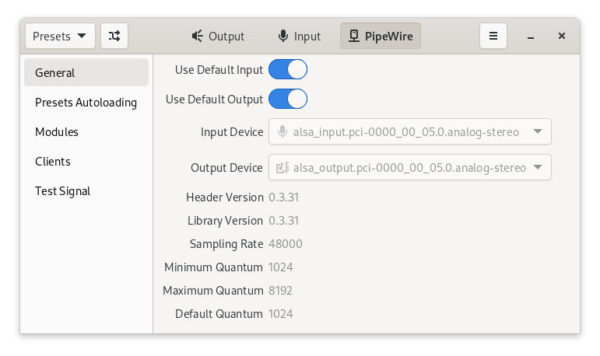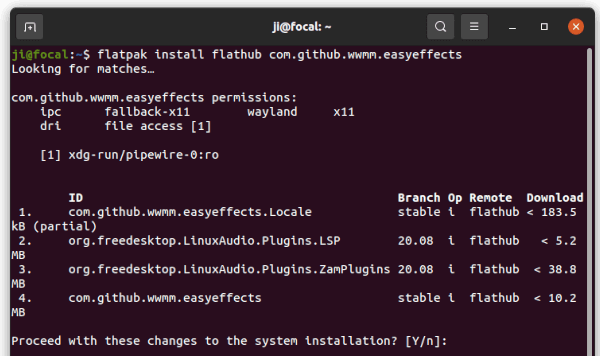The popular audio manipulation tool, PulseEffects, finally adds supports for PipeWire sound server by re-naming to EasyEffects.
EasyEffects is a GTK4 (switched to Qt since version 8.0) app designed for only PipeWire sound server. For PulseAudio, default sound service in current Ubuntu releases, PulseEffects is still available.
The UI looks almost same as before, and it may apply effects including Auto gain, Bass enhancer, Bass loudness, Compressor, Convolver, Crossfeed, Crystalizer, De-esser, Echo Canceller, Equalizer, Exciter, Expander, Filter, Gate, Limiter, Loudness, Maximizer, Multiband compressor, Multiband gate, Noise reduction, Pitch, Reverberation, Stereo tools.
Besides manipulating sound output, it may also apply effects to an input device, such as a microphone. This is, for example, useful in audio recording, but it also works well during voice conversations.
The PipeWire tab contains the options to select input & output devices, edit presets, and test signal.
How to Install EasyEffects in Ubuntu Linux:
The tool has been made into official repositories for Arch Linux, Gentoo, openSUSE and NixOS. Since Ubuntu sticks to PulseAudio, you install EasyEffects only when PipeWire is present as sound server (Read this tutorial for more).
UPDATE July 2023: For Ubuntu 23.04 +, EasyEffects has been made into the official repositories. So, either search for and install it from Ubuntu Software.
or press ‘Ctrl+Alt+T’ to open terminal and run command below to install it:
sudo apt install easyeffects
For Ubuntu 20.04 and Ubuntu 22.04, do following steps to install the app as Flatpak package:
1.) EasyEffects so far is only available as Flatpak package. Firstly, search for and open terminal either from the Activities overview screen or by pressing Ctrl+Alt+T on keyboard. When it opens, run command to install the flatpak daemon first if you don’t have it:
sudo apt install flatpak
2.) Next add the flathub.org repository, the place hosts a large amount of Flatpak apps by running command in terminal:
flatpak remote-add --if-not-exists flathub https://flathub.org/repo/flathub.flatpakrepo
3.) Finally install EasyEffects flatpak package via command:
flatpak install flathub com.github.wwmm.easyeffects
If everything goes well, you may either launch it by searching for and opening from the overview screen, or run flatpak run com.github.wwmm.easyeffects command to start it from terminal.
Uninstall EasyEffects:
To remove the tool, open terminal, copy and paste the single command below and hit run:
flatpak uninstall --delete-data com.github.wwmm.easyeffects


















Thanks for the detailed explanation!
Sounds like someone copied your article and stole the credits in another language:
“https://www.edivaldobrito.com.br/como-instalar-o-manipulador-de-audio-easyeffects-no-linux-via-flatpak/”
How was that a detailed explanation?
por l momento no funciona
After hundreds of megabytes downloaded, trying to run this:
== flatpak run com.github.wwmm.easyeffects
pops up a window telling me I need to install pipewiwire 3.0.44.
All this to adjust the base level of a speaker in the year 2023.
I appreciate your effort but some projects need work.
Thanx
Sheemon
It should find a place in the debian repos…
flatpak is … as bad as snaps
Now, it’s available in system repositories for Ubuntu 23.04/23.10. Though, there’s still no deb for 22.04.